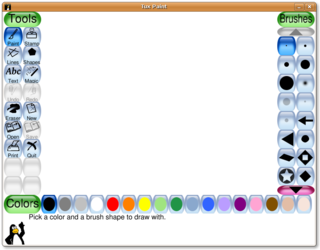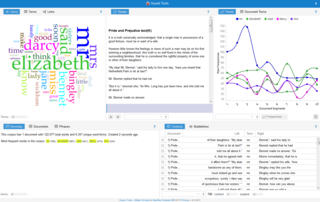Related Research Articles

Textual criticism is a branch of textual scholarship, philology, and literary criticism that is concerned with the identification of textual variants, or different versions, of either manuscripts (mss) or of printed books. Such texts may range in dates from the earliest writing in cuneiform, impressed on clay, for example, to multiple unpublished versions of a 21st-century author's work. Historically, scribes who were paid to copy documents may have been literate, but many were simply copyists, mimicking the shapes of letters without necessarily understanding what they meant. This means that unintentional alterations were common when copying manuscripts by hand. Intentional alterations may have been made as well, for example, the censoring of printed work for political, religious or cultural reasons.
The Perseus Digital Library, formerly known as the Perseus Project, is a free-access digital library founded by Gregory Crane in 1987 and hosted by the Department of Classical Studies of Tufts University. One of the pioneers of digital libraries, its self-proclaimed mission is to make the full record of humanity available to everyone. While originally focused on the ancient Greco-Roman world, it has since diversified and offers materials in Arabic, Germanic, English Renaissance literature, 19th century American documents and Italian poetry in Latin, and has sprouted several child projects and international cooperation. The current version, Perseus 4.0, is also known as the Perseus Hopper, and is mirrored by the University of Chicago.

Bibliography, as a discipline, is traditionally the academic study of books as physical, cultural objects; in this sense, it is also known as bibliology. English author and bibliographer John Carter describes bibliography as a word having two senses: one, a list of books for further study or of works consulted by an author ; the other one, applicable for collectors, is "the study of books as physical objects" and "the systematic description of books as objects".

The Palace is a computer program to access graphical chat room servers, called palaces, in which users may interact with one another using graphical avatars overlaid on a graphical backdrop. The software concept was originally created by Jim Bumgardner and produced by Time Warner in 1994, and was first opened to the public in November 1995.

Tux Paint is a free and open source raster graphics editor geared towards young children. The project was started in 2002 by Bill Kendrick who continues to maintain and improve it, with help from numerous volunteers. Tux Paint is seen by many as a free software alternative to Kid Pix, a similar proprietary educational software product.
The Institute for Advanced Technology in the Humanities (IATH) is a research unit of the University of Virginia, USA. Its goal is to explore and develop information technology as a tool for scholarly humanities research. To that end, IATH provides Fellows with consulting, technical support, applications development, and networked publishing facilities. It cultivates partnerships and participates in humanities computing initiatives with libraries, publishers, information technology companies, scholarly organizations, and other groups residing at the intersection of computers and cultural heritage.

Fedora is a digital asset management (DAM) content repository architecture upon which institutional repositories, digital archives, and digital library systems might be built. Fedora is the underlying architecture for a digital repository, and is not a complete management, indexing, discovery, and delivery application. It is a modular architecture built on the principle that interoperability and extensibility are best achieved by the integration of data, interfaces, and mechanisms as clearly defined modules.
Roy Rosenzweig Center for History and New Media (RRCHNM), formerly the Center for History and New Media (CHNM), is a research center specializing in digital history and information technology at George Mason University (GMU) in Fairfax County, Virginia. It was one of the first digital history centers in the world, established by Roy Rosenzweig in 1994 to use digital media and information technology to democratize history: to incorporate multiple voices, reach diverse audiences, and encourage popular participation in presenting and preserving the past. Its current director is Lincoln Mullen.

Digital humanities (DH) is an area of scholarly activity at the intersection of computing or digital technologies and the disciplines of the humanities. It includes the systematic use of digital resources in the humanities, as well as the analysis of their application. DH can be defined as new ways of doing scholarship that involve collaborative, transdisciplinary, and computationally engaged research, teaching, and publishing. It brings digital tools and methods to the study of the humanities with the recognition that the printed word is no longer the main medium for knowledge production and distribution.
Jerome John McGann is an American academic and textual scholar whose work focuses on the history of literature and culture from the late eighteenth century to the present.
BasisTech is a software company specializing in applying artificial intelligence techniques to understanding documents and unstructured data written in different languages. It has headquarters in Somerville, Massachusetts with a subsidiary office in Tokyo. Its legal name is BasisTech LLC.

Johanna Drucker is an American author, book artist, visual theorist, and cultural critic. Her scholarly writing documents and critiques visual language: letterforms, typography, visual poetry, art, and lately, digital art aesthetics. She is currently the Martin and Bernard Breslauer Professor in the Department of Information Studies at the Graduate School of Education and Information Studies at UCLA. In 2023, she was elected to the American Philosophical Society.
Digital history is the use of digital media to further historical analysis, presentation, and research. It is a branch of the digital humanities and an extension of quantitative history, cliometrics, and computing. Digital history is commonly digital public history, concerned primarily with engaging online audiences with historical content, or, digital research methods, that further academic research. Digital history outputs include: digital archives, online presentations, data visualizations, interactive maps, timelines, audio files, and virtual worlds to make history more accessible to the user. Recent digital history projects focus on creativity, collaboration, and technical innovation, text mining, corpus linguistics, network analysis, 3D modeling, and big data analysis. By utilizing these resources, the user can rapidly develop new analyses that can link to, extend, and bring to life existing histories.
Biblical software or Bible software is a group of computer applications designed to read, study and in some cases discuss biblical texts and concepts. Biblical software programs are similar to e-book readers in that they include digitally formatted books, may be used to display a wide variety of inspirational books and Bibles, and can be used on portable computers. However, biblical software is geared more toward word and phrase searches, accessing study bible notes and commentaries, referencing various modern translations, cross-referencing similar passages and topics, biblical dictionaries, original language texts and language tools, maps, charts, and other e-books deemed relevant to understanding texts from a philological approach.

GPAC Project on Advanced Content is an implementation of the MPEG-4 Systems standard written in ANSI C. GPAC provides tools for media playback, vector graphics and 3D rendering, MPEG-4 authoring and distribution.

The University of Florida Digital Collections (UFDC) are supported by the University of Florida Digital Library Center in the George A. Smathers Libraries at the University of Florida. The University of Florida Digital Collections (UFDC) comprise a constantly growing collection of digital resources from the University of Florida's library collections as well as partner institutions. Founded in April 2006, UFDC has added over 622,114 items - books, newspapers, oral histories, videos, photos, data sets, and more - with over 14 million pages.
The Maryland Institute for Technology in the Humanities (MITH) is an international research center that works with humanities in the 21st century. A collaboration among the University of Maryland College of Arts and Humanities, Libraries, and Office of Information Technology, MITH cultivates research agendas clustered around digital tools, text mining and visualization, and the creation and preservation of electronic literature, digital games and virtual worlds.

John P. Bell is a digital artist, educator, and software developer at Dartmouth College and the University of Maine whose work centers on creative collaboration and digital culture.
Islandora is a free and open-source software digital repository system based on Drupal and integrating with additional applications, including Fedora Commons. It is open source software. Islandora was originally developed at the University of Prince Edward Island by the Robertson Library and is now maintained by the Islandora Foundation, which has a mission to, "promote collaboration through transparency and consensus building among Islandora community members, and to steward their shared vision for digital curation features through a body of software and knowledge."
Blacklight is an open-source Ruby on Rails engine for creating search interfaces on top of Apache Solr indices. The software is used by libraries to create discovery layers or institutional repositories; by museums and archives to highlight digital collections; and by other information retrieval projects.